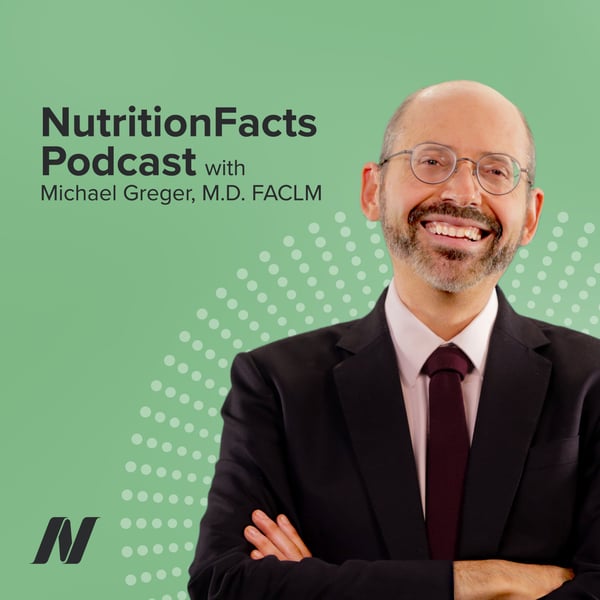The Carbon Footprint of What We Eat
Nutrition Facts with Dr. Greger
[email protected]
4.8 • 3.6K Ratings
🗓️ 28 January 2021
⏱️ 18 minutes
🧾️ Download transcript
Summary
This episode features audio from Win-Win Dietary Solutions to the Climate Crisis, Which Foods Have the Lowest Carbon Footprint?, and Which Diets Have the Lowest Carbon Footprint?. Visit the video pages for all sources and doctor's notes related to this podcast.
Transcript
Click on a timestamp to play from that location
| 0:00.0 | I know you work hard to make the best lifestyle choices so you can improve your health destiny and longevity. |
| 0:06.5 | And there's lots of information out there on how to do just that. |
| 0:10.8 | So where do you start? |
| 0:12.5 | Well, we start with the facts. |
| 0:16.0 | Welcome to the Nutrition Facts Podcast. |
| 0:18.8 | I'm your host, Dr. Michael Greger. |
| 0:20.6 | My job is to bring you the latest peer-reviewed nutrition and health research and share it with you here. |
| 0:27.4 | Today, we look at the carbon footprint of what we eat, starting with the findings of the Eat Lancet Commission, |
| 0:36.6 | a collaboration between 37 experts from 16 countries that lays out the best diet for human and planetary health. |
| 0:45.0 | Scientists have a clear moral obligation to clearly warn humanity of any catastrophic threat and to tell it like it is. |
| 0:55.1 | In November 2019, more than 11,000 scientists from 150 countries clearly and unequivocally declared |
| 1:02.6 | that planet Earth is facing a climate emergency. |
| 1:07.3 | CO2 levels are rising, the glaciers are melting, and Antarctica is melting. |
| 1:12.8 | The ocean is getting hotter, more acidic, sea levels are rising, and so are extreme weather events. |
| 1:20.9 | And yes, fossil fuel use is going up like air travel, but so is per capita meat consumption. |
| 1:27.8 | In fact, one of the solutions they offer to help the climate crisis is eating most of the plant-based foods |
| 1:34.0 | while reducing the global consumption of animal products. |
| 1:38.3 | And what makes designing a sustainable diet so easy is that the same advice, like eat less meat, |
| 1:44.9 | is good for both personal health like reducing the risk of our number one killer as well as for planetary health. |
| 1:52.3 | The least healthy foods also cause the worst environmental impact. |
| 1:57.7 | The foods with the most nutrition just so happen to be the foods that cause the lowest greenhouse gas emissions. |
| 2:05.4 | So you get this win-win effect. |
... |
Please login to see the full transcript.
Disclaimer: The podcast and artwork embedded on this page are from [email protected], and are the property of its owner and not affiliated with or endorsed by Tapesearch.
Generated transcripts are the property of [email protected] and are distributed freely under the Fair Use doctrine. Transcripts generated by Tapesearch are not guaranteed to be accurate.
Copyright © Tapesearch 2025.

